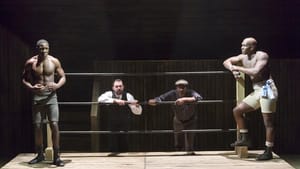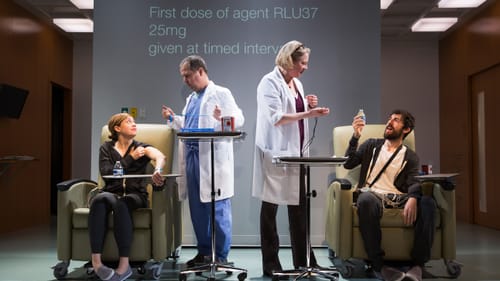Stay in the Loop
BSR publishes on a weekly schedule, with an email newsletter every Wednesday and Thursday morning. There’s no paywall, and subscribing is always free.
Strong statements on small stages
'The Royale' and 'The Effect' in New York

Uptown and downtown, small theater spaces are coming alive with compelling new works.
The Royale, Marco Ramirez’s gripping new drama now playing at Lincoln Center Theatre, is loosely inspired by the life of Jack Johnson (1878-1946), the acclaimed African-American boxer and so-called Negro Heavyweight Champion of the world. In Ramirez’s play, he’s called Jay “The Sport” Jackson, and he challenges the white world heavyweight champion (here called Bernard “The Champ” Bigsby) to come out of retirement and face him in the ring. (In real life, the retired champ, James J. Jeffries, was the challenger in the 1910 “Fight of the Century.”)
The Royale, Marco Ramirez’s gripping new drama now playing at Lincoln Center Theatre, is loosely inspired by the life of Jack Johnson (1878-1946), the acclaimed African-American boxer and so-called Negro Heavyweight Champion of the world. In Ramirez’s play, he’s called Jay “The Sport” Jackson, and he challenges the white world heavyweight champion (here called Bernard “The Champ” Bigsby) to come out of retirement and face him in the ring. (In real life, the retired champ, James J. Jeffries, was the challenger in the 1910 “Fight of the Century.”)
The story plays out on an empty platform that represents a boxing ring, where we first see Jay in action, grinding his opponent (the hapless Fish, another black boxer) to a pulp. Jay is a larger-than-life figure — “toes like Jack Nimble, fists like John Henry,” as his manager Max describes him. He’s got great appetites (fancy clothes, white hotels, and white women) and an even greater sense of confidence. Once he decides to challenge the white heavyweight, he enlists Fish as his sparring partner and trains for the match under the tutelage of his determined manager (the play’s only white character) and his loyal trainer Wynton.
The stakes, however, are higher than just a match. “You were ready to take over the world the day you were born,” Jay’s sister Nina tells him. “The rest of us aren’t.” Jay’s ultimate goal is to make right the terrible wrong of being born black in a white man’s world at the turn of the 20th century.
Surrealistic staging
The power of The Royale comes not only from its theme but also from its theatricality. Under Rachel Chavkin’s inspired direction, the fight scenes are choreographed in a surrealistic style, with rhythmic clapping as punctuation and foot-stomping as a substitution for punches and blows. Chavkin makes an astonishing choice in staging the final fight between Jay and Bigsby: she places Jay’s sister Nina (played by Montego Glover) right in the ring to articulate the interior dialogue that’s going on in Jay’s mind as he thrusts and parries with an unseen opponent. The scene is stunning, as is the entire production.
Khris Davis gives a formidable performance as Jay, and the five-member ensemble is uniformly excellent. Jay’s trainer, Wynton (played by Clarke Peters), offers a heartbreaking story that explains the play’s title. He explains that, when he was a young, he and five other young black boxers were herded into a boxing ring called the Royale, where they were blindfolded and ordered to box against each other in front of an all-white crowd, who tossed coins into the ring. The last man standing was offered the winnings. Wynton was the victor, and when he took off his blindfold to pick up the prize, he found the blood-caked teeth of his fellow pugilists among the coins. It’s a gut-wrenching image of a terrible moment in black history that audiences will not forget.
Dark satire

Downtown at the intimate Barrow Street Theatre, Lucy Prebble’s unsettling new drama, The Effect, is a dark satire on the mental health industry. Two subjects, Tristan and Connie, are recruited for a four-week antidepressant study under the supervision of psychiatrists Lorna James and Toby Sealey, but the testing goes awry. The subjects fall madly in love with each other and proceed to manipulate their medications to understand whether their love is real or drug-induced. This causes conflict between the supervising psychiatrists, who, it’s revealed, have also been entangled in a destructive love relationship. As a result, there are two major psychological breakdowns, one suffered by a patient and one by a physician. Ultimately, you don’t know who’s sick and who isn’t, and whether any of it is real or whether we’re in a mind-altering sci-fi nightmare.
David Cromer directs an able five-member ensemble on an empty stage, bare save the essential hospital furniture. The cold neutrality of the scene contrasts with white-hot intensity of the two young subjects, played with desperate passion by Susannah Flood and Carter Hudson. As I perceived it, The Effect (voted best new play by the UK Critics’ Circle in 2012) is an indictment of our flawed attempts to understand the most common malaise of our time, depression. Moreover, it’s a sad commentary on our difficulty to forge and sustain relationships based on the simplest and purest of elements — love.
What, When, Where
The Royale, by Marco Ramirez, directed by Rachel Chavkin. Through May 1 at Lincoln Center Mitzi Newhouse Theater, 150 W. 65th Street, New York. lct.org.
The Effect, by Lucy Prebble, directed by David Cromer. Through June 19 at the Barrow Street Theatre, 27 Barrow Street, New York. barrowstreettheatre.com
Sign up for our newsletter
All of the week's new articles, all in one place. Sign up for the free weekly BSR newsletters, and don't miss a conversation.
